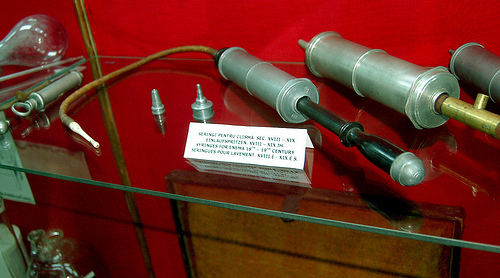Louis XIV was a man who was more than fond of using enemas on a regular basis - in his defence it was a wide-spread fashion among the royals and nobles of Europe since it was thought to be very good for your health. Rumour has it that the Sun King had thousands of enemas performed on his poor behind through-out his lifetime. It was not uncommon that the King excused himself after having had his supper and went into his private apartments, had an enema performed and then rejoined his courtiers! As for Louis XIV himself he was a fervent believer that the regular enemas was the reason behind his good health and his long life.
 |
These buttons are a satirical depiction of
Louis XIV during and after an enema |
Of course the very elite of France was not satisfied with using common water for this delicate "operation". Instead the fluids were perfumed with rose, orange and angelica and was even slightly coloured by the request of the users. Louis XIV's father and predecessor, Louis XIII, had been fond of enemas too but he preferred his with almond milk; during one (!) year he had 212 enemas performed.
One little anecdote created quite a sensation but is a perfect example of how common a phenomenon this was. During a court ball the Duchesse de Bourgogne was engaged in a conversation with Louis XIV himself when a maid of hers snug in under the Duchesse's elaborate ball gown and performed an enema right on the spot!
 |
These are the kind of instruments used
at the time |
It was not just the high and mighty who were expected to have this peculiar habit. During the enema-fanatic Louis XIV's reign every maid who served at court - especially the ones who performed a duty close to a member of the nobility - was expected to have an enema performed daily so that her work would not be interrupted by visits to the toilet! Thus it became customary for the nobles to ask their maids whether they had performed their "toilet" upon their arrival. Also, young ladies of wealthier families who were not at court nor even of the nobility followed the trend because it was believed to be good for the complexion.



No comments:
Post a Comment